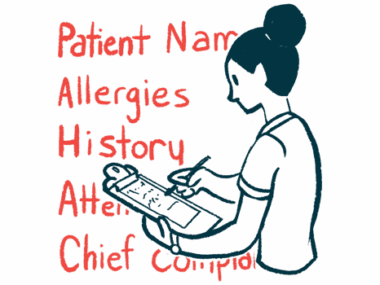Working through an uncommon type of EDS pain flare
Chronic fatigue can lead to a cycle of pain with Ehlers-Danlos syndrome
Written by |

Sometimes the pain from Ehlers-Danlos syndrome (EDS) is just weird. I don’t have a better way to describe it. A specific area may hurt when I’m in a pain flare, but it mostly feels like a vague “pain bubble” that I’m sort of immersed in. But occasionally, I’ll have a pain flare that’s specific, and I can pinpoint it with accuracy.
I missed my last massage appointment because I had to go out of town at the last minute to help a friend. I was already in a pretty sore place, and missing my bodywork quickly magnified it. Suddenly, I had very specific pain points that I could identify.
When I was lying in bed trying to get to sleep, I could feel the muscles along my rib cage twitching. They were tight and painful, and it was immediately obvious just how inflamed and aggravated they were. The pulsing from trigger points is always an odd feeling to me, no matter how many times it happens.
I’m not sure which caused which, but my shoulder was also incredibly tight. It’s been sore lately, and I could feel the pain radiate from its epicenter along my trapezius muscle up into my neck, then down into my back and across the front of my shoulder. Combining my various pain points, I felt like my rib cage and upper body were being squished from the tightness.
The resulting pain made it difficult to fall asleep, even though I was overtired. Being able to feel everything so specifically kept my brain busy, as I have a tendency to analyze patterns and search for connections. So I continued to lie there exhausted, with my brain spinning, until eventually I gave in and turned on one of my favorite audiobooks.
That activity is usually a big no for me at bedtime. I love audiobooks and reading, but I think it’s important to cut ties with technology and not be dependent on it for relaxation or sleep. Occasionally, though, I know that the ability to focus on something else will help calm my mind when it’s spinning.
So I went to my go-to in those moments: Camille Di Maio’s novel “The Memory of Us,” one of my all-time favorites. Because I’ve read it countless times, I can simply focus on the storyline, allowing my mind to quiet itself and drift off to sleep.
While I try not to read before bed often, at times like these, it makes a huge difference. Chronic fatigue is one of my worst EDS symptoms, and the inability to fall asleep because of pain can start a whole other snowball effect that worsens the situation. While it’s important to have rules and boundaries, it’s also necessary to know when to break them to help myself out a bit!
Note: Ehlers-Danlos News is strictly a news and information website about the disease. It does not provide medical advice, diagnosis, or treatment. This content is not intended to be a substitute for professional medical advice, diagnosis, or treatment. Always seek the advice of your physician or another qualified health provider with any questions you may have regarding a medical condition. Never disregard professional medical advice or delay in seeking it because of something you have read on this website. The opinions expressed in this column are not those of Ehlers-Danlos News or its parent company, Bionews, and are intended to spark discussion about issues pertaining to Ehlers-Danlos.






susan cutuli
First of all thank-you for writing how i feel.
Can you expound on the “ pulsing of trigger points”.
Like you i have so many different types
Of pain its hard to explain it. My pain is very dynamic but can always be found in certain places. My PT has been focusing a lot on ribs lately and while i believe she is on to something i also noticed many tender spots.
Margie Callahan
I enjoyed your story about a recent flare-up. I've been in a flare up for a few weeks now. Not fun. I'm 71 yo and don't do much anymore. Ugh!
Valerie A
Some of your recent pain descriptions worry me that you could be progressing to thoracic outlet syndrome, where super tight "crappy" scalene muscles compress major nerves in the thoracic area of the neck. I hope you read about it. It can cause pain and tightness to spread to the whole upper body...ribs, neck, migraines, arms, hands, etc. It can take a vascular surgeon to do surgery to release some of the muscles to make more space for the nerves, and there aren't many surgeons truly qualified to do this. It's not an easy road, so do everything you can now less invasive to improve. I found all of my soft tissues get "clumpy" too, with maybe excess collagen or something? It irritates and entraps the nerves along their whole pathway. Self care with the Rapid Release Therapy machine has made a world of difference in my range of motion. I can't reach everywhere with it (like my full back) but I take in and the massage therapist will get those spots. I'm a lot older than you, so I've had more years for this crud to build up so it's taking a long time to break it all down. My TOS did develop when I was your age though. I wonder if I had noticed and been able to work the crud sooner if I could have prevented needing surgery.
Maureen Le Blanc
I thought I was the only one who suffered periods of chronic
fatigue when the pain gets really bad. Glad to hear that others
do too - misery needs company! Lots of ice, lots of ice and
I’m a little better today!
T
My ribs are scarred into abnormal place and my 4 adult children are having the same issue. Any ideas to avoid that besides massage and pt? They do pain injections for one daughter?
Tiffany
Just noticed that you went to John Hopkins to receive your diagnosis…? Were you on a forever waiting list? I finally have Medicaid and have been thinking the only way I am going to begin to start living any kind of tolerable life at all is by going to get an unchallengeable diagnosis. Though so far, 2 of my daughters have been diagnosed and my oldest has already had disability for 4-5 years after having her hip nailed together at 25… I wonder if they take Medicaid. (JH) My middle daughter has mitral valve prolapse and she is just 21. I will be 55 this year and only starting learning about all this when my oldest was first diagnosed 5 years ago. Oh, and a little word of advice, get educated and read up before trying to get your primary or any doc really(even genetics) b/c if you have to do interviews w/ different specialists and you can’t describe your symptoms accurately or answer the questions correctly b/c you have had this condition your whole life w/o knowing and/or understanding behaviors that had you known would have clued you in way back when! I mean I was was so good at my own self denial that I did not realize I was overlooking So Many symptoms, and my adaptations to my daily habits and ways I did things differently were actually signs of how my hEds was affecting me for many decades. Like being asked if I was a clumsy child or accidental prone… I immediately was like well no, not really. I was embarrassed by the question. But when I think of all the falls and ankle rolls I have had my whole life, and if you see my feet in a relaxed fashion they literally hang in such a way that people are like”Can you walk?” Or that I have not stood in a shower for 40 years( b/c I felt unsteady in the shower and lightheaded) so I just started sitting in the shower when I was a teenager. I am So textbook it is Not even amusing, yet I constantly have to defend that I have problems(plural) and chronic/acute pain w/ flares. It seems I have so many overlapping syndromes, but the more I learn, the more it seems nearly All of my symptoms are related to my hEds. And as a gen X, I was brought up to work hard, power through, push pain down((b/c I was too young to legitimately complain about pain…) I was literally so out of touch w/ my own body, and then the more I read and learned, I realized that I had spent my entire life downplaying my physical problems to such an extent that didn’t recognize symptoms and clues that I had a valid issue, and had spent my life rationalizing away my experiences so I could still be “normal” . It was months after that first visit to Genetics that I was still piecing together my lifetime of symptoms and adaptive behaviors to realize I had accidentally mislead the docs at my interview w/ Genetics. I know I have gone on what I guess sounds like a rant, but my point is to know thyself, learn as much as possible, keep a notebook( I have actually created a manual,lol!) Primarily, do you have the correct language and have had time to look back at your symptoms w/ fresh eyes so you don’t get invalidated and have to start all over. There is No cure, but the sooner you b/c educated and can appropriately advocate for yourself, the sooner you will be able to co create a plan of action ( PT , pain management,investigate possible autoimmune co-morbidities) and b/c empowered to increase your quality of life.